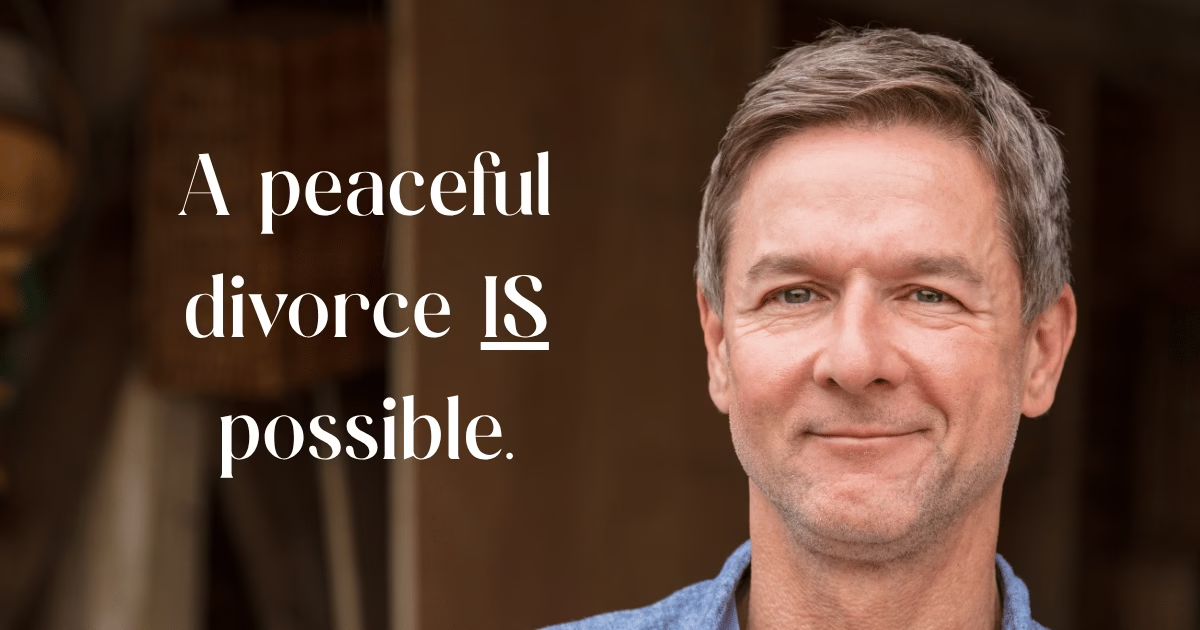Divorce can shake every part of your world — your emotions, your finances, even your sense of who you are. The decisions are big, the pace is fast, and the stakes feel high.
Even when both partners want a respectful, cooperative process, it’s easy to get swept into conflict or confusion. That’s where divorce coaching can make all the difference.
As both a mediator and divorce coach, I’ve seen that people don’t just need legal or logistical help during divorce — they need clarity, communication skills, and emotional steadiness to move through the process with dignity. Coaching provides that foundation, either individually or together as a couple, often making mediation smoother and more productive.
What Divorce Coaching Really Is
Divorce coaching is a goal-oriented, practical support process designed to help people navigate divorce with more confidence, less conflict, and a clear plan for what comes next.
It’s not therapy. It’s not legal representation. It’s structured guidance that keeps you focused, calm, and intentional through every stage of transition — whether you’re still deciding how to proceed or already in mediation.
In simple terms: divorce coaching is preparation and perspective.
It helps you:
- Understand your priorities before decisions are made
- Communicate effectively under stress
- Approach discussions with clarity rather than emotion
- Stay organized and forward-focused
When you feel steady and informed, you bring that energy into mediation — and that’s where real progress happens.
Individual Coaching vs. Couples Coaching
Divorce coaching can be tailored to either one person or both.
Individual Coaching
For one-on-one clients, coaching focuses on self-management — clarifying goals, preparing for conversations, handling triggers, and staying grounded through uncertainty.
You might use individual coaching if:
- You feel anxious or unprepared for mediation
- You want to improve your communication and confidence
- You’re struggling to make clear decisions
- You need a neutral space to plan, reflect, and reset
Couples Coaching
In some cases, both spouses work with a divorce coach together (outside of mediation sessions). This type of coaching can:
- Strengthen communication before mediation begins
- Help both parties articulate what matters most
- Identify shared goals (such as stability for children)
- Build skills for respectful negotiation
- Lay groundwork for cooperative co-parenting
Couples coaching isn’t about reconciliation or therapy. It’s about learning to navigate divorce together without hostility — so mediation can focus on problem-solving, not emotional repair.
How Divorce Coaching Complements Mediation
Because I serve as both mediator and coach, I want to be clear:
Mediation and coaching are not competing services. They’re complementary stages of the same journey.
Mediation is where the agreements are made.
Coaching is where the people prepare to make them well.
Here’s how they work together:
| Coaching Focus | Mediation Focus |
| Emotional readiness and communication skills | Structured negotiation and agreement-building |
| Clarifying goals, values, and deal-breakers | Turning those goals into practical, legal terms |
| Managing reactions and conflict patterns | Facilitating balanced, respectful dialogue |
| Staying grounded between sessions | Resolving specific issues efficiently |
| Post-divorce adjustment and co-parenting tools | Documenting and finalizing terms |
When clients have done coaching before or alongside mediation, sessions tend to be calmer, faster, and more productive. You arrive ready to focus on solutions rather than rehashing the past.
The Benefits of Divorce Coaching
1. Clarity
Coaching helps you sort through the noise — emotional, logistical, or external — so you know what truly matters before you sit down to negotiate. You’ll be able to say, “Here’s what I value most,” instead of “I don’t even know what I want.”
2. Confidence
With a plan in place and a better understanding of the process, you feel empowered to speak up, ask questions, and make thoughtful decisions.
3. Calm
Divorce can trigger powerful emotions. Coaching provides tools to recognize and manage them, keeping you centered even when conversations get tense.
4. Communication
Coaching teaches clear, respectful communication that makes mediation smoother — and co-parenting healthier in the long run.
5. Cooperation
When both partners have support, they’re more likely to engage in mediation collaboratively rather than defensively. That mindset saves time, money, and stress.
6. Continuity
Coaching continues after the decree — helping you adjust to post-divorce life, refine co-parenting routines, and rebuild confidence in your next chapter.
What Divorce Coaching Looks Like
Every coaching plan is unique, but most follow a rhythm that aligns with the divorce process:
Step 1: Clarify Your Goals
We begin by identifying what matters most — for you, your children, and your future. That clarity becomes your compass for every decision that follows.
Step 2: Create Your Roadmap
Together, we outline next steps: preparing for mediation, organizing documents, and setting up communication systems that lower stress and confusion.
Step 3: Build Tools & Skills
We work through real scenarios — texts, emails, or upcoming conversations — so you feel equipped to handle them calmly and effectively.
Step 4: Prepare for Mediation
We review potential discussion points, anticipate challenges, and strengthen your ability to stay solution-focused in the room.
Step 5: Transition Gracefully
After agreements are reached, coaching can help you implement them — especially around co-parenting, boundaries, and rebuilding your life with confidence.
This process can be short-term (a few sessions of preparation) or ongoing (support throughout the divorce timeline). The goal is always the same: help you stay clear, calm, and cooperative.
A Real Example
(Details changed for privacy.)
“Melissa and Rob” had been married for 18 years. They wanted a peaceful divorce but couldn’t seem to get through a conversation without re-litigating old arguments. Both agreed to mediation — but their first session left them frustrated and stuck.
They decided to do a few coaching sessions together. We focused on communication ground rules, recognizing triggers, and defining what a “respectful divorce” would look like for them. By their next mediation session, the difference was remarkable.
They came prepared, spoke calmly, and reached agreement on major issues in a single day. Coaching didn’t replace mediation — it made it work better.
Common Questions
Do we both have to do coaching?
No. Many clients work individually. But when both parties participate (even separately), the process becomes far smoother because both are learning tools for clarity and calm.
Is this therapy?
No. Coaching is present- and future-focused. We don’t analyze childhood patterns; we build skills and strategies to help you make confident decisions now.
If you’re my mediator, can you also be my coach?
Typically, the roles are separate to maintain neutrality. I can serve as a neutral mediator for both parties or as a coach for one or both — but not both roles at once. If I’m coaching one party, I’ll refer you to another trusted DWD mediator for the actual mediation sessions.
Can divorce coaching replace mediation?
No. Mediation is where legal agreements are crafted. Coaching prepares you for mediation and supports you in following through on agreements afterward.
When should I start coaching?
Ideally, as early as possible — even before filing. The sooner you have clarity and calm, the more peaceful your process will be.
Why Divorce Coaching Matters Now
Today’s divorces are more complex than ever — not just legally, but emotionally and logistically. Between co-parenting apps, digital finances, and high-stress lifestyles, couples need new skills to communicate well under pressure.
Coaching fills that gap. It’s proactive, not reactive. Instead of waiting until mediation breaks down, coaching gives you the mindset and tools to keep it on track from day one.
It’s also confidential, flexible, and designed for your real life. Whether you meet in person or online, sessions are focused, compassionate, and actionable — so you can move forward each week feeling lighter and more capable.
A Peaceful Divorce Is Possible
Divorce doesn’t have to mean devastation. It can be a turning point — a moment of self-respect, calm communication, and cooperative planning for the future.
Coaching helps you get there.
By pairing coaching with mediation, you create the strongest path possible:
- Coaching prepares your mindset and plan.
- Mediation resolves your agreements and turns them into action.
Together, they transform what could be a battle into a dignified, cooperative transition.
Ready to Begin?
If you’re ready to handle your divorce with clarity and composure — or if you’re a couple who wants to preserve respect while working through tough decisions — divorce coaching can help.
Whether you need individual guidance, couples preparation, or full coaching-plus-mediation support, I’m here to help you move forward with strength and peace.
Schedule a confidential consultation to learn how we can tailor coaching to your needs — and set the stage for a smoother, more peaceful divorce.
About Michael Lemon

Michael Lemon, Attorney, Mediator, Divorce Coach, Divorce With Dignity – Middle Georgia
Michael Lemon is a divorce coach, mediator, and attorney who has dedicated his career to helping Georgia families navigate separation and divorce with dignity. Drawing on more than two decades of experience in law and conflict resolution, Michael brings a calm, compassionate, and deeply practical approach to one of life’s most difficult transitions.
He believes that when people are given the right tools and support, divorce doesn’t have to destroy relationships or drain finances—it can become an opportunity to reset life with clarity, confidence, and mutual respect.
Michael is known for his steady, reassuring presence and his ability to translate complex emotional and legal issues into clear next steps. His work emphasizes communication, emotional steadiness, and thoughtful planning—helping individuals and couples alike find resolution without unnecessary conflict.
Based in Middle Georgia, Michael serves clients both locally and virtually, supporting those who want a peaceful, cooperative, and affordable alternative to traditional litigation. Whether through coaching, mediation, or both, his goal is simple: to help families move forward with stability, compassion, and dignity intact.


